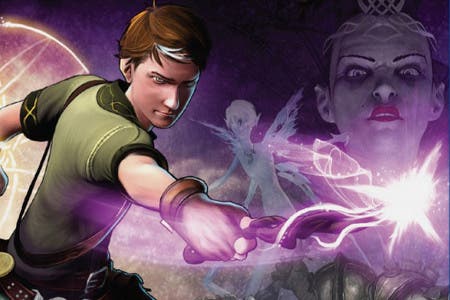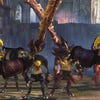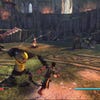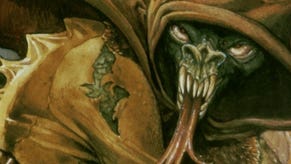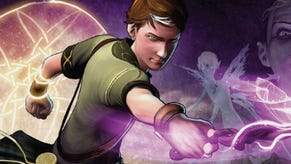Sorcery Review
Wand direction.
Sorcery's a game about wizards - and wizards, it transpires, spend a lot of time strafing. In Sony's delicately pretty spell-'em-up, your Move controller is a wand, see, and your wand, in turn, is essentially a gun.
If this calls to mind the recent Harry Potter outing with all the shooting and the taking cover, don't worry. That was thick corporate slurry from concept to implementation - just another unpleasant by-product of the increasingly grim Hogwarts machine. Sorcery's an entirely different proposition. It's slight, but it's also lively, personable, and rather sweet while it lasts. If you have any kids knocking about the place, it might even be a little bit, you know, magical.
It's a simple tale, too, about a boy who's a sorcerer's apprentice, and a cat who might not be a cat at all. The boy, as the format more or less demands, likes to mess around with dangerous things he doesn't understand, and pretty soon he's gotten himself involved in a whole mess of magical trouble. After that, the duo is off to save the world - and probably right some ancient wrongs along the way. That's how it generally is with sorcerers and apprentices. And cats, come to think of it.
As motion control games go, Sorcery has a wonderfully level-headed set-up, with movement handled by a thumbstick (with a trigger used to centre an infrequently wayward automatic camera), and all your spell-casting taken care of with targeted flicks of the Move controller. The Move controller doesn't have to double up on the equivalent of mouselook duties, in other words, and it doesn't even have to be visible to the PlayStation Eye - or whatever it's called these days - when you aren't in a fight. It's pretty much an ideal arrangement.
With the foundations taken care of, Sorcery offers four or five hours of quietly engrossing adventure, filled with gorgeous landscapes and clever detailing. The plot takes you through spooky necropolises (I checked and this does appear to be the plural form, which is a shame), sleepy villages and dreamy forests where bad things lurk in the shadows. Clichés all, but necessary clichés when you have wizards and witches knocking around. Besides, they're also beautifully lit, handsomely designed clichés, with thick stone doors stained gold by hazy torches, tree branches that seem to scratch at the stars, and a frightening castle that looks like it's been knotted together out of hot glass.
The campaign, meanwhile, is largely interested in shoot-outs, but it still finds the time for some simple locked-door puzzles along with plenty of treasure chests to loot, a handful of transformation sequences that see you scampering through tiny gaps as a rat or soaring about as a bird, and a genuinely cute crafting system in which you blend ingredients together to make bubbling tonics.
The tonics themselves provide a series of relatively straightforward perks - they generally boost attacks, slice through cooldowns, extend health bars and that sort of thing - but discovering the recipes is an entertaining business in its own right as you combine different liquids, powders and other doo-dads at random and wait to see what you end up with. It's enthralling stuff, as it happens, and using the Move controller to then shake out your grave dust, pour your faerie honey and grind your mushrooms into a cauldron makes for a fabulous bit of whimsy. Don't forget to stir.
The Move controller's everywhere you look, in fact, whether you're shifting mysterious standing stones around with imperious swipes, spinning invisible clockwork to mend carts and staircases and shattered sigils, turning keys, inserting magical gems or - best of all - shaking potions to mix them and then upending them to drink. Sorcery makes plenty of use of Move's loveliest feature, too - that weird rubber ball on the end of the unit that can cycle through a series of bold colours at a moment's notice. There's a sense throughout the game that the controller's found a place where it really fits. Move makes for a weird assault rifle or mouse pointer sometimes: it seems far happier as a wand.
Move's pretty crucial to the combat, too, and the combat's pretty crucial to Sorcery. This is, above all else, a game about blasting things with spells, and its campaign likes to send you racing down pretty corridors and through larger, more open spaces filled with all manner of deadly creatures hungry to take a bite out of you. Ideally, you're meant to despatch these monsters - spiders, skeletons, horrible little faeries and a range of bosses - with precise blasts from your magic wand. In reality, though, that isn't always possible.
It isn't always possible because the basic spell-casting movement, ingrained in children since the earliest of bedtime stories, is a brisk little flick of the hand, and a brisk little flick is a lot harder to target than a standard point-and-shoot set-up. Equally, while you can aim these flicks around the screen with a basic sense of direction in mind some of the time, the game often moves too fast for you to do even that, as enemies swarm and run and leap - and then dance out of the way again.
Luckily, there's a generous lock-on. Even more luckily, the developers seem to realise that this whole precision thing was never going to work out in the first place. Instead of putting the emphasis firmly on aiming, then, the design team has thrown in some smart tactical stuff for you to focus on instead. There's a trigger shield for blocking incoming projectiles that can also be used to knock foes back and shatter their defences, for example, and there are stun moves and dodges, all of which will need to be mastered as you fling your shots around, generally sending them off to roughly the right part of the screen but often letting the game handle that sort of thing on your behalf.
More importantly, there are different types of spells to learn as you move through the game, and they tend to be pretty satisfying. There's the standard arcane bolt for starters: a pink tracer bullet that does a little damage and uses no mana. Then come the recharging lot, the earthquake spells, fire spells, frost spells, wind spells and - best of all - lightning spells. Most have an area version as well as a ranged attack, and the game encourages you to combine them in creative ways as your enemies get hardier. Freeze a faerie with ice, say, and then shatter the ice with arcane shots. Perfect. Fire off a tornado, set it ablaze, and then target volleys through the resulting twist of flame to turn your bolts into hot little cannonballs.
It's a gratifying solution for a combat game that struggles a little with the niceties of human-controlled targeting, and it ensures that the outcome of a fight is still dependant on skill - just a different kind of skill than usual. The only disappointment is that some of Sorcery's cooler ideas - shots you can curve to strike hidden enemies and a knockback blast that sees you slamming the wand into the ground - don't come off with quite enough consistency to make them truly useful.
Such irritations matter less than you might expect. If anything, it's the Move controller rather than that clumsy apprentice or his mysterious cat that emerges as Sorcery's true star. If you're an eight-year-old kid, this short burst of adventure is going to offer you an afternoon or two of vivid fantasy with a wand in your hand and an arsenal of spells in your head, and your only major complaint will be that it doesn't last a few hours longer. If you're older, it won't have quite the same impact - but it's still going to provide a few colourful thrills.
